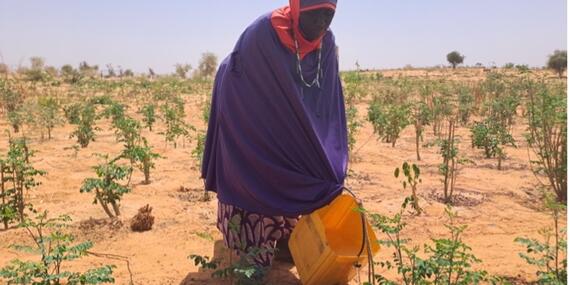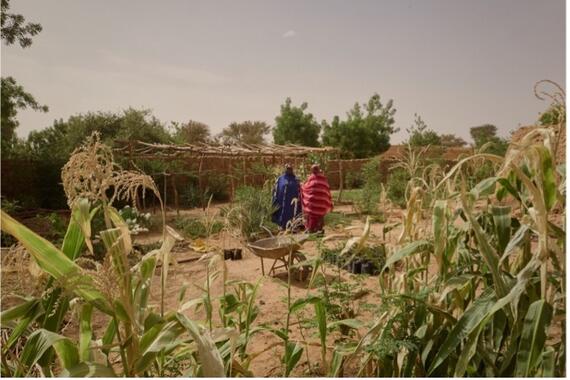Niger: Refugees and hosts bond over feeding their families

By Abdoulaye Boubacar Hamani
Mahamadine, a Malian refugee in Niger, heads a unique gardeners’ association in Ouallam Department in Tillabéri Region, which is severely affected by the food crisis. Comprised of refugees, locals and internally displaced persons (IDPs), the association runs a market garden to feed their communities. Ouallam’s local population is about 90,800 strong. As well as locals, there are about 17,000 IDPs and at least 8,500 refugees from Mali.
Ouallam was once one of Niger’s food baskets over the past three decades. But due to cycles of drought ravaging the Sahel, Ouallam is now experiencing severe food insecurity; its people do not have access to adequate food.
The latest Integrated Food Security Phase Classification numbers (March 2023 from Cadre Harmonisé) show that more than 36 per cent of Ouallam’s population can eat only one meal a day. The food crisis has deepened since 2019 due to the influx of people fleeing threats and other abuses by non-State armed groups operating in the region. As a result, Ouallam’s population, including the new arrivals, decided to join forces and plant the garden to feed themselves. Thanks to their efforts, they can now feed their families by supplementing the insufficient humanitarian assistance they receive.
Mahamadine explains: "We started this garden in 2020. A committee of four refugees, two members of the host community and two IDPs ensures that activities run smoothly.”
The garden has 400 plots, which Mahamadine says were distributed among the three communities (local population, refugees and IDPs) by consensus.
Despite challenges, there is still social cohesion and a spirit of sharingin Ouallam – refugees, IDPs and the host community live in harmony. It is not uncommon for marriages to be organized between different groups.
A place of work and cohesion
Mariama Alassane, known as Marie, is a member of Ouallam’s host community. Marie, 53 and a mother of nine, cultivates a plot of land in the market garden.
She talks about the cordial relations between the various communities: "Both refugees and IDPs take part in our family ceremonies, and we take part in theirs. We also organize tontines [social gatherings to raise money for loans for individuals], in which they participate.
The social fabric between communities is strong beyond just farming together. Marie, who belongs to the Zarma ethnic group, says: "The president [a Tuareg refugee] joked that we are thieves." What would surely cause offence elsewhere is a source of laughter here; joking kinship is a way to break down social and ethnic barriers. It has existed for ages between the Tuaregs and the Zarmas, and between other ethnic groups, and it’s not limited only to Niger.

In addition to the garden, there are other meeting and exchange spaces where these different groups come together almost daily to socialize and strengthen their coexistence. These include the brick factory that helped build the Ouallam refugees' urbanized area, and youth sorganizations such as the J'aime Ma Commune (I Love My Commune) association, which brings together the youth from across the three communities.
Challenges
Despite the groups’ best efforts, needs persist. Mahamadine says: “Farmers often complain about the size of the plots, which do not always allow them to harvest enough to make ends meet. There are also water supply problems. One international organization is in the process of setting up a project to support farmers."
Despite at least 27 humanitarian organizations operating in the region, the humanitarian needs of the IDPs, refugees and host communities remain unmet due to limited funding and humanitarian access constraints.
(translated by Alioune Ndiaye)
